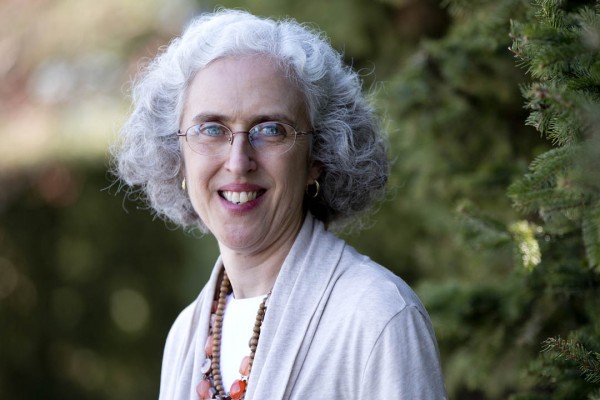Maine Campus Compact award recipient Emily Kane
Maine Campus Compact will present the 2013 Donald Harward Award for Faculty Service-Learning Excellence to Whitehouse Professor of Sociology Emily Kane.
Kane, of Auburn, structures much of her coursework around community-engaged research. She is one of three faculty members at Maine schools to receive this year’s Harward Award, and is one of two members of the Bates community to receive a 2013 award from MCC.
The other is Kimberly Sullivan, a senior psychology major from Brunswick who was honored with the Heart and Soul Award for her work as co-founder of the Tree Street Youth Center, in Lewiston. Read more about Kimberly Sullivan.
Kane, Sullivan and the other recipients will receive their awards in an April 30 ceremony in the Hall of Flags at the Maine State House, in Augusta.
A member of the Bates faculty since 1996, Kane is interested in social inequality and social change. She has made a rigorous effort to incorporate community-engaged learning into her course work, in collaboration with the college’s Harward Center for Community Partnerships. (Both the MCC award and the Harward Center are named for Donald W. Harward, Bates’ sixth president.)
Kane’s classes explore the benefits — academic, cognitive and civic — that service-learning provides students. Focusing on social justice, students are placed with organizations dedicated to social change. Through reflection, analysis and research, they make a meaningful contribution to the community partners.
For instance, students in Kane’s “Research Methods for Sociology” course undertook a wide variety of research — from transcribing interviews with disadvantaged residents to analyzing public perceptions of food insecurity — that supported a 2009-10 community food assessment in Lewiston-Auburn.
The goal of such projects, says Kane, is to “teach students to collect and analyze data using methods that sociologists use, but along the way to give them some real substance as well.”
Kane has worked closely with the Harward Center to develop a curriculum that incorporates community-engaged learning in progressive steps based on course level. Proceeding from first-year seminars to upper-level courses, students move deeper into research that serves community needs even as they build their understanding of the field of sociology.
“I am firmly committed to reciprocal partnerships that provide significant benefits to both the academic partners and the community partners,” Kane says. Community organizations that have partnered with her students include Hillview, a local public housing community; the Trinity Jubilee Center; the Somali-Bantu Youth Association; and College for ME — Androscoggin.
Also receiving the Harward Award are Paul Gebhardt, adjunct associate professor at the Maine College of Art, and Tom Mullin, associate professor of parks and forest resources at Unity College.
Maine Campus Compact is a coalition of 18 member campuses whose purpose is to catalyze and lead a movement to reinvigorate the public purposes and civic mission of higher education. Learn more.
